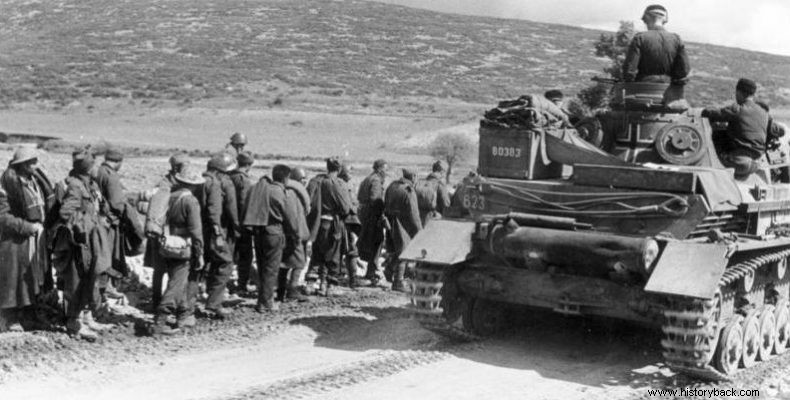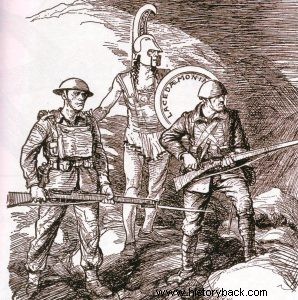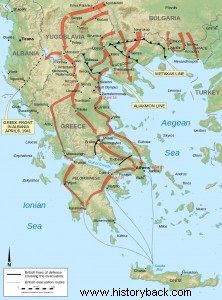
The cooperation between Greeks and British already from October 28, 1940, until the occupation of Greece by the Germans was not flawless. The British, right from the start, saw the involuntary involvement of Greece in the Second World War as a golden opportunity to open a new Balkan front, on the same lines as the counterpart of the First World War.
From the beginning the British insisted on sending their troops to Greece in order to establish their presence. The then Prime Minister Ioannis Metaxas, however, with the agreement of Chief General Papagos, refused to accept the mission of the meager British forces, whose presence in the country could only hasten the German invasion , without contributing to the defense of the country. Only after the unexpected death of Metaxas did they impose their views.
Thus it was decided to send to Greece a British Expeditionary Force, consisting of an Australian and a New Zealand infantry division and the 1st Armored Brigade with about 100 tanks, mostly light. Papagos insisted that these forces cover the left of the "Metaxa" Line in the Krousion-Doirani area.
But the British refused and finally moved to the Vermio-Olympus location, facing northeast. The gap that existed between Bermium and the Greek positions in Northern Epirus would be filled by the Greek Army Department of Central Macedonia (TCM) and the Yugoslavs , either with their neutrality, or with their involvement in favor of the Greeks and the British, in the war.
What followed were the well-known events of Yugoslavia's accession to the Axis, the internal revolution and the change in Yugoslavia's attitude towards the Axis, which caused a feeling of relief to the Greeks and the British.
The Greco-British forces were finally deployed in two locations, the Beles-Nestos location (Metaxa Line) and the Vermio-Olympos location (two British infantry divisions of Group W, two Greek infantry divisions of the TSCM (Karassos) and as a guard the 1 British Armored Brigade). The British forces marched towards the sea and the Greek forces on the inner (north-west) side of the defensive arrangement.
The Greek forces of the TSCM, the 12th and 20th Infantry Divisions were the most recently formed, had serious deficiencies in material and armament, but had excellently organized their defensive location. However, the rapid Yugoslav collapse that followed forced the Greek commander-in-chief Al. Papago to rearrange the forces of the TSCM, so that they form a front towards the North.
At the same time, he sent the Cavalry Division (reinforced with the 21st Infantry Brigade) to cover the area of Florina-Pisoderi-Prespa. The forces of the TSCM had to make contact with the forces of the TSDM (Tsolakoglou) and form a united front. The British 1st Th. Brigade moved towards Monastiri to fight a rear guard battle, buying time for reorganisation. The Hellenic 20th MP was positioned between the Petra and Vegoritita lakes.
There was the Kleidi crossing , the defense of which was undertaken by the Australian 19th Brigade, with four battalions of infantry and a squadron of field artillery. On the left was the - 21st, nominally, Brigade, which had only 850 fighting men, (guards, wounded of the Albanian Front who had just recovered, etc.) included in two battalions of the 88th Infantry Regiment and armed with old weapons. The third battalion of the 21st remained under the command of the Cavalry Division.
The 21st Brigade undertook to cover an 8 km long front. To the right of the Australians the Dodecanese Regiment of the 20th MP was lined up. Despite its title, only the 1st Battalion and part of the 2nd was manned by Dodecaneses who had escaped from the then Italian-occupied Dodecanese to fight.
The other two battalions were also manned with men of older classes, replacements from the Navy, recovering wounded, etc. The Regiment was deployed at the location of Arnissa, without having had time to organize the terrain, supported by four artillery divisions (15 guns).
The British, however, were not so happy with their new arrangement. So General Wilson was thinking of retreating from the location of Key, before even fighting. On April 9, there was a meeting of Wilson with the commanders of his major units and the participation of Major General Karassos. The British wanted to retreat immediately, but Karassos told them that his infantry units would have no luck against the Germans.
Thus it was decided that the withdrawal of the Greek forces would begin on the night of April 11, with British vehicles. On April 13, the Greek and British forces had to occupy the line Olympos-Vourinos-Siniatsiko.
The battle at the Key
The Germans attacked the location of Kleidi on three axes, hitting the entire Greco-British front simultaneously, on April 10. However, their first attack failed, most bloody indeed in the area of the Dodecanese Constitution.
The next day, April 12, they repeated the attack with overwhelming means. This time they concentrated their effort against the British forces at the Key Pass itself. Fighting continued throughout the day, with the Germans pinned down, although they managed to make contact with the main British line of defence. On the contrary, the Constitution of the Dodecanese was not disturbed.
Despite the up to then successful resistance of the Greek-British forces, General Wilson decided to retreat, essentially abandoning the Greek forces to their fate , since it was impossible for the Greek divisions, which were in contact with the enemy, to succeed in collapsing.
Wilson's decision was also disastrous for his own forces, which were also in close contact with the Germans, who obviously would not allow the British to collapse comfortably. So when Wilson had left only one battalion in the location, as a rear guard, the Germans attacked and after a short battle they destroyed three of the four British battalions.
Those of Wilson's men who were not killed or captured abandoned arms and materiel and fled southward in disorder. The Greek divisions fighting on either side also paid the price for Wilson's folly. The 88th Infantry Regiment broke up as it was flanked by its exposed right. Its hero commander, lieutenant colonel Georgios Hondros, was killed fighting the Panzers with his revolver!
The Dodecanese Regiment held off the Germans and began to retreat in order, in two phalanxes. One phalanx, however, was overtaken by the Panzers and destroyed . After all, the Constitution had been forced to abandon the cannons that supported it. Part of the Syntagma managed to reach Amyntaeo on foot. From there the British provided him with vehicles and he retreated to Ptolemaida.
The British withdrawal from the site, which was manned exclusively by British divisions at its most vital point, could be considered hasty to say the least.


